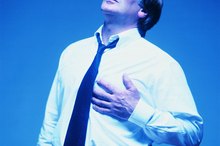What does fact checked mean?
At Healthfully, we strive to deliver objective content that is accurate and up-to-date. Our team periodically reviews articles in order to ensure content quality. The sources cited below consist of evidence from peer-reviewed journals, prominent medical organizations, academic associations, and government data.
- Med-line Plus: Hepatic Encephalopathy
- "Alcohol Research and Health"; Hepatic Encephalopathy; Roger Butterworth PH.D,D.SC.; 2003
The information contained on this site is for informational purposes only, and should not be used as a substitute for the advice of a professional health care provider. Please check with the appropriate physician regarding health questions and concerns. Although we strive to deliver accurate and up-to-date information, no guarantee to that effect is made.
Hepatic Encephalopathy Low-Protein Diet
Hepatic encephalopathy occurs when your liver is not able to rid the blood of toxins such as ammonia and manganese 1. This results in the toxins accumulating in the blood and entering the brain. Diet plays an important role in treating hepatic encephalopathy because a low-protein diet can help lower ammonia levels in the blood 1.
If you are experiencing serious medical symptoms, seek emergency treatment immediately.
Causes
Hepatic encephalopathy is caused by disorders that affect your liver function such as liver cirrhosis and hepatitis 1. There are some medical conditions that can mask or mimic symptoms of hepatic encephalopathy including alcoholism, meningitis and sedative overdose 1.
Symptoms and Diagnosis
What Are the Causes of Low Plasma Protein?
Learn More
Symptoms of hepatic encephalopathy may include confusion, poor concentration, disorientation, agitation and slurred speech 1. Symptoms can appear suddenly or they can begin slowly and worsen over time. Diagnostic tests must be done to diagnose hepatic encephalopathy and may include a complete blood count, CT scan of the brain and checking ammonia levels in the blood 1.
Protein
Protein in the diet may need to be limited in order to lower ammonia levels. Ammonia is produced when protein is digested, which under normal circumstances can be cleared from the blood by the liver. Animal proteins may need to be limited to 40 grams per day, with unlimited vegetable protein. Animal protein sources include:
- chicken
- turkey
- red meat
- fish
- dairy products
- eggs
Major sources of vegetable proteins include beans, lentils, legumes and tofu.
- Protein in the diet may need to be limited in order to lower ammonia levels.
- Animal proteins may need to be limited to 40 grams per day, with unlimited vegetable protein.
Other Considerations
Symptoms of Decreased Liver Function
Learn More
There is some concern over severe restriction of protein in hepatic encephalopathy patients 1. If protein intake is too low, loss of muscle mass can occur. Working with a physician and a registered dietitian can help ensure that protein intake is adequate based on individual needs. Acute hepatic encephalopathy may be treatable; however, possible complications may include brain swelling, permanent damage to the nervous system and coma 1.
Related Articles
References
- Med-line Plus: Hepatic Encephalopathy
- "Alcohol Research and Health"; Hepatic Encephalopathy; Roger Butterworth PH.D,D.SC.; 2003
- U.S. National Library of Medicine, MedlinePlus. Loss of brain function: liver disease. Updated July 11, 2017.
- National Organization for Rare Disorders. Hepatic Encephalopathy. Updated 2011.
- Bleibel W, Al-Osaimi AM. Hepatic encephalopathy. Saudi J Gastroenterol. 2012;18(5):301-309. doi:10.4103/1319-3767.101123
- Shaker M, Carey WD. Hepatic encephalopathy. Cleveland Clinic. Updated August 2017.
- Fiati Kenston SS, Song X, Li Z, Zhao J. Mechanistic insight, diagnosis, and treatment of ammonia-induced hepatic encephalopathy. J Gastroenterol Hepatol. 2019;34(1):31-39. doi:10.1111/jgh.14408
- Formentin C, Garrido M, Montagnese S. Assessment and management of sleep disturbance in cirrhosis. Curr Hepatol Rep. 2018;17(1):52-69. doi:10.1007/s11901-018-0390-1
- Ferenci P. Hepatic encephalopathy. Gastroenterol Rep (Oxf). 2017;5(2):138-147. doi:10.1093/gastro/gox013
- Cordoba J. Hepatic encephalopathy: from the pathogenesis to the new treatments. ISRN Hepatol. 2014;2014:1-16. doi:10.1155/2014/236268
- Patidar KR, Bajaj JS. Covert and overt hepatic encephalopathy: diagnosis and management. Clin Gastroenterol Hepatol. 2015;13(12):2048-2061. doi:10.1016/j.cgh.2015.06.039
- Vilstrup, H.; Amodio, P.; Bajaj, J.; et al. "Hepatic Encephalopathy 404 404 in Chronic Liver Disease: 2014 Practice Guidelines from AASLD and EASL." The AASLD Practice Guideline. 2014:3-67.
- Conn, H. "Hepatic encephalopathy." Schiff, L and Schiff, E., eds. Diseases of the Liver. 7th ed. Philadelphia, PA: Lippicott; 1993:1036-1060.
Writer Bio
Jennifer Nall is a registered dietitian specializing in weight management. She works with bariatric patients in nutrition, weight-loss and fitness counseling. Nall holds a master's degree in nutrition from Texas A&M University, with graduate research published in the "Journal of Nutrition."









